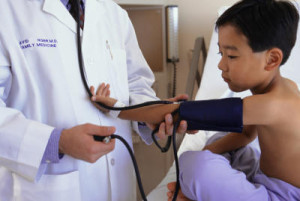A lot us think hypertension, better known as high blood pressure, affects only people who are older, and while this was true before the proliferation of sodium- and cholesterol-laden food products, hypertension is now likely to have an effect on young children and adolescents as well. Hypertension in these mentioned age groups has become a growing societal problem and learning everything about this medical condition including its causes, consequences, and available treatments, can be crucial in helping protect children from it.
Why the Blood Pressure Rises and What Causes It
 The blood’s force when it flows and circulates through its vessels is called blood pressure, and under regular circumstances, the heart normally pumps blood through the blood vessels (which are present throughout the body) without a hitch; these vessels never stop widening and contracting to keep the blood flowing and circulating properly.
The blood’s force when it flows and circulates through its vessels is called blood pressure, and under regular circumstances, the heart normally pumps blood through the blood vessels (which are present throughout the body) without a hitch; these vessels never stop widening and contracting to keep the blood flowing and circulating properly.
Hypertension, or high blood pressure, occurs when the blood pushes against these vessels in a manner harder than usual, causing damage to the heart, other organs, and the blood vessels themselves. Hypertension’s exact causes are yet to be confirmed but some of these factors could be responsible for its development:
- Obesity.
- Smoking.
- Thyroid disorders.
- Sedentary lifestyle.
- Excessive sodium in diet.
- Excessive alcohol consumption.
- Chronic kidney disease.
- Genetics.
- Stress.
- Family history of high blood pressure.
- Adrenal disorders.
- Older age.
Obesity is the primary cause of high blood pressure in children. Other than the older age factor mentioned above, and perhaps smoking, all the factors could be the cause of juvenile hypertension, but obesity takes the cake.
Elements on Which Blood Pressure May be Dependent
If this condition is left untreated, hypertension could eventually because injurious to a child’s brain, kidneys, eyes, and, of course, the heart. Diagnosed early, treatment can be applied and the child’s condition may be monitored to enable him or her to have a normal, active, and healthy life.
Blood pressure involves blood coming from the individual’s heart and is pumped into arteries through the body’s circulatory system; blood pressure is also blood coming from said arteries when they become resistant to this flow of blood. Blood pressure is dependent on the following elements:
- Body temperature.
- Posture.
- Body activity.
- Emotional condition.
- Medications.
- Body rest.
- Sleep apnea or other sleep disorders.
- Diet.
Direct Influences on Obesity or Being Overweight
Regular excessive consumption of food with high sodium, sugar and fat content: when a child’s diet has the wrong food types such as snacks with additives and seasonings and sugar-filled beverages. Parents should oversee the quantity and quality of the food that their children consume.
Too little or nearly no activity: children these days are way too preoccupied with the computer for video games and television for cable channel shows. Both activities leave a child sedentary and leads to an increase in energy intake which leads to snacking on junk food.
How to Treat Hypertension in Children
Generally, the treatment for hypertension in children is not much different from its treatment for adults. Some guidelines are listed below for parents with hypertensive children who may want a hands-on approach to the condition:
1. Dietary Approaches to Stop Hypertension or DASH: this is a diet plan which is determined to keep saturated fat from a child’s diet as much as possible by the consumption of more fresh vegetables, whole grains, and fresh produce, and fruits. DASH ensures that a child consumes just the right amounts of sodium and sugar, which is not the processed or refined kind.
2. Consult a dietician/nutritionist: either individual can help you make the right food choices for your child’s diet. Such a professional would be able to meet the goals of eating healthy and nutritious foods without compromising on flavor or taste.
3. Avoid smoke from tobacco: blood pressure can rise when tobacco smoke is inhaled. Your child shouldn’t be subjected to tobacco smoke inhalation because even secondhand smoke can raise the blood pressure.
. Medications: if your child’s hypertension is severe or doesn’t seem to respond to dietary or lifestyle changes, he or she may require medication such as beta blockers which help prevent the body’s adrenaline production since adrenaline is considered a stress hormone capable of making the heart beat faster and harder, resulting in tightening of blood vessels.
Discuss the Possible Use of a Beta Blocker with Your Child’s Pediatrician
One such beta blocker is Bystolic® (generically known as nebivolol), a licensed prescription drug for treating hypertension. This medication effectively reverses the effect that stress hormones have, decreases heart rate, and lowers diastolic and systolic blood pressure.
Although this beta blocker is currently prescribed to adults suffering from high blood pressure, there is no report that Bystolic® has been approved for use by young children or adolescents; this doesn’t mean that you can’t discuss the possibility of its treatment use with your child’s pediatrician.
Share This